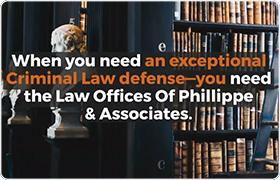Lozano Felony Lawyer, Texas
Sponsored Law Firm
-
 x
x

Click For More Info:
-
The Law Office Christopher Phillippe
104 North Express Way Brownsville, TX 78521» view mapCriminal Defense Law Helping Those Facing Difficult Times
We are confident in our ability to resolve difficult legal issues, and we will use our years of experience to represent your best interests.
800-659-6781
Not enough matches for Lozano Felony lawyer.
Below are all Lozano Criminal lawyers.
Robert Louis Santos
Family Law, Divorce & Family Law, Criminal
Status: In Good Standing Licensed: 34 Years
 Christopher Phillippe Brownsville, TX
Christopher Phillippe Brownsville, TX Practice AreasExpertise
Practice AreasExpertise
